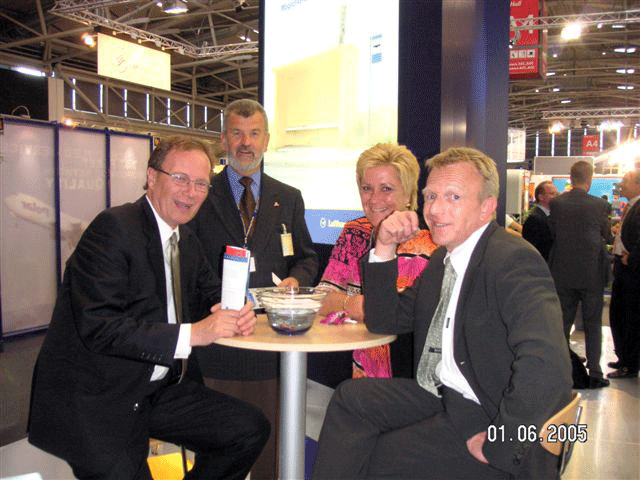

 |
 |
|
|
|
||

At
this year's Transport Logistic Munich Lufthansa Cargo chairman of the
board, Jean-Peter Jansen Christian Fink, Heide Enfield, and Gerd Fricke
took the time to gather around the bistro table. |
Ask Christian Fink, Managing Director
of Lufthansa Cargo Charter (LCCA) what is “job one” these days,
and after he says, “go out and get business,” he quickly adds:
“We don’t want to be just considered
as the charter outlet of Lufthansa Cargo.
“That is an image of the past that lingers.”
In the original business plan Lufthansa Cargo
told its new subsidiary to “be independent,” but always consider
selling available Lufthansa Cargo flights first.
Another early business edict also indicated that
15 to 20% of total charter revenues should be moved on LH-equipment.
But reality sometimes is never as good as one’s
best fantasy, so when it got down to it, business found its own way.
Although apparently it is always best to ask “mama”
first and then continue with the deal, in the end only 8% of charter flights
in 2004 were flown aboard LCAG-freighters.
The ratio was a bit better when there were still
some 747Fs around.
But now in 2005 gradually with its presence in
Europe, in North America and in Asia, Lufthansa Charter’s independence
is becoming more apparent.
Christian Fink is definite, “we are not
dreamers.
“But in the very near future Lufthansa Cargo
Charter Agency should be the first door to be knocked on when somebody, somewhere
in the world needs a non-scheduled cargo flight.
“We are working toward that goal.
“Sure the image of Lufthansa cargo helps
“But we want to be the “go to”
custom provider for an expansive menu of individual spot-solutions that demand
high level reliability and total air cargo expertise.”
“When we started,” comments Heide
Enfield, LCAC, head of business development and marketing, “our charter
clients often inquired to make sure their load was on a Lufthansa airplane.
“Customer attitudes have changed during
the past years.
“Shipping today is a matter of hard economics
and less a matter of airplane loyalty, than in past days I think.
“But customers want to know that whatever
the price, that the consignment is in Lufthansa’s hands.
“Who is flying which airplane is secondary.”
FlyingTypers asked Christian Fink what
he would change or implement about the air cargo industry?
“I fully agree that a healthy competition
has always been the main motor in any business.
“But I wish that all concerned in this nice
old fashioned transportation chain from a to b would be more flexible in our
relations with each other.
“We all must realize, that we do not produce
a product.
“The product is what we carry from here
to there including, machines, textiles, or semi-conductor products.
“We only provide the service.
“In the best logistics terms, I would like
to embellish a bit saying we deliver our services at the right time to the right
spot, at the right price.
“My view is that it is an absolute must
for the future of the air cargo industry that agents and carriers must learn
to trust each other.
“Part of that new normal for things includes
the exchange of information.
“I think if we just open up a bit with each
other, everybody will benefit by saving considerable amounts of money, nerves
and time.
“I cannot repeat it often enough, the only
one who buys our combined service package is the shipper or consignee footing
the bill.
“We are a pure service industry, especially
in the charter segment.
“Our job is to listen to the customer.
“In many ways the charter business is more
emotional than the routine supply chain by air.
“The customer is paying for “his”
airplane.
“There is a heightened sense of risk and
adventure to the freight movement when you think of it that way.
“But I repeat, this industry can do a better
job of pulling together.
“One action would be to develop a more coordinated
message to the general public that reinforces the level of velvet glove treatment
that exists today in the air cargo business.
“The passenger side of the airline business
has brought forth that message for years and it’s been quite successful.”
It’s worth mentioning that LCCA is quite
successful. The first year 2002 closed with revenues around EUR 39 million,
delivered by a staff of 15 people.
In 2004 although LCCA staff swelled to 25 people
they organized some 600 movements delivering some EUR 58 million.
This year despite fuel and other elements of change
the charter outfit is targeting a 20 to 25 % increase above last year.
Lufthansa Cargo employs an IT-tool that is operational
24 hours a day serving the global market called “BORIS” or Brokerage
Online Reservation and Information System.
Before closing we must talk about an element so
natural in any market place, competition.
“Christian Fink puts it this way:
“We know that there are plenty of competitors
out there.
“But we believe that in this relatively
new constellation, being a fully owned subsidiary of the number one cargo airline
in the world has an edge.
(Guenter Mosler)